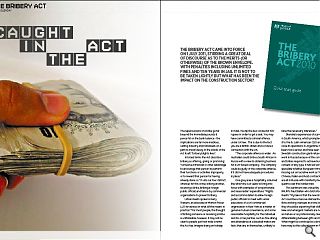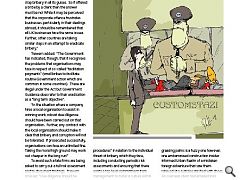The Bribery Act
13 Jan 2012
The Bribery Act cme into force on July 1, 2011, stirring a great deal of discourse into the merits (or otherwise) of the brown envelope. With penalties including unlimited fines and 10 years in jail it is not to be taken lightly but what has been the impact on the construction sector?
In broad terms the Act describes bribery as offering, giving or promising: “someone a financial or other advantage to encourage that person to perform their functions or activities improperly, or to reward that person for having already done so.” It sets out four distinct offences for this crime; bribing another, receiving a bribe, bribing a foreign public official; and failure by commercial organisations to prevent bribery.
Urban Realm spoke to Kerry Trewern, an associate of Morton Fraser LLP, for advice on what all this means in practice: “For most people, the thought of bribing someone or receiving a bribe is unthinkable, however, it may not be clear to people just how wide a remit the Act has. Imagine being on holiday in India. You tip the bus conductor 100 rupees in order to get a seat. You may have committed a criminal offence under UK law. This is due to the fact you are a British citizen and so have a connection with the UK.
“The corporate offence is wider. An Australian could bribe a South African in Russia with a view to obtaining business for a UK-based company. The company could be guilty of the corporate offence, if it did not have adequate procedures in place.”
One grey area is hospitality, a blurred line which the Act seeks to bring into focus with examples of “proportionate and reasonable” expenditure: “Flights and accommodation to allow foreign public officials to meet with senior executives of a UK commercial organisation in New York as a matter of genuine mutual convenience, and some reasonable hospitality for the individual and his or her partner, such as fine dining and attendance at a baseball match are facts that are, in themselves, unlikely to raise the necessary inferences.”
Skanska’s experiences of scandal in South America, which prompted it to fire its Latin American CEO and close its operations in Argentina, have been more serious and have seen the Swedish construction giant refuse to work in Russia because of the corruption and bribes required to achieve building consent of any type. It has led some to speculate whether European firms are missing out on lucrative work as Turkish, Chinese, Italian and Arab contractors are all in Russia with manifestly fewer qualms over this market trait.
This sentiment was voiced by RMJM’s Paul Stallan who told Urban Realm: “My take is that the new Bribery Act could be a massive disincentive for Brits working overseas at a time when they should be exporting their skills. New and emergent markets are not as mature or as professionally clear on differentiating between gifts and bribes. What might be construed as a bribe here may be the cultural norm in Russia or China.”
This has led some to wonder whether UK companies are disadvantaged in a cut throat global marketplace but Trewern dismisses those fears: “Businesses must accept that the Government is determined to stop bribery in all its guises. So if offered a bribe by a client then the answer must be no! While it may be perceived that the corporate offence frustrates businesses, particularly in their dealings abroad, it should be remembered that all UK businesses face the same issues. Further, other countries are taking similar steps in an attempt to eradicate bribery.”
Trewern added: “The Government has indicated, though, that it recognises the problems that organisations may face in respect of so-called “facilitation payments” (small bribes to facilitate routine Government action which are common in some countries). These are illegal under the Act but Government Guidance does refer to their eradication as a “long term objective”.
“In the situation where a company hires a local organisation to assist in winning work, robust due diligence should have been carried out on that organisation. Further, any contract with the local organisation should make it clear that bribery and corruption will not be tolerated. If prosecuted successfully, organisations can face an unlimited fine. Taking the moral high ground may work out cheaper in the long run!”
To avoid such a fate firms are being asked to carry out a full risk assessment and to document findings. Trewern stresses: “Due diligence should be carried out on any potential business associate. Staff should be trained appropriately. It may even be worth sending the firm’s anti-bribery and corruption policies to an associated third party, if the risk is deemed to be great. “
To avoid prosecution all businesses MUST demonstrate that they have adequate procedures in place as informed by six, flexible, principles. These include “proportionate procedures” in relation to the individual threat of bribery which they face, including conducting periodic risk assessments and ensuring that there exists a top level commitment from management to foster a culture within which bribery is unacceptable.
In addition it is required that due diligence is undertaken of outside contractors, including local partners, to mitigate possible bribery risks. This must complement clearly articulated communications including training whilst continually monitoring and reviewing these principles in order to effect improvement where necessary.
The line between hospitality and greasing palms is a fuzzy one however, one embarrassed construction insider informed Urban Realm of a mistaken foreign adventure that saw them relieved of a suitcase stashed with shoes. An overseas client had emailed links to their favourite footwear on Clarks website while discussing arrangements for a meeting. These were duly proffered upon arrival alongside several iPads – followed up by a jewellery shopping trip to a local mall. Of course upon returning to the UK the client subsequently did a bunk.
Illustration, if any was needed, that the long arm of the law isn’t the only pitfall where bribery is concerned.
Read next: Alloa College
Read previous: Winter Manifesto
Back to January 2012
Browse Features Archive
Search
News
For more news from the industry visit our News section.
Features & Reports
For more information from the industry visit our Features & Reports section.




